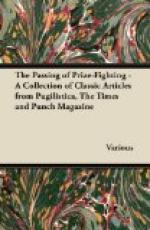Castaldo, being anxious to murder the Cardinal with, we suppose, all “means and appliances to boot,” asks of heaven a trifling favour:—
“Heaven, that look’st on,
Rain thy broad deluge first! All-teeming
earth
Disgorge thy poisons, till the attainted
air
Offend the sense! Thou, miscreative
hell,
Let loose calamity!”
But it is not only in the “sublime and beautiful that Mr. Stephens’s genius delights” (vide Opinions, p. 4); his play exhibits sentiments of high morality, quite worthy of the “Editor of the Church of England Quarterly Review,” the author of “Lay Sermons,” and other religious works. For example: the lady-killer, Castaldo, is “hotly” loved by the queen-mother, while he prefers the queen-daughter. The last and Castaldo are together. The dowager overhears their billing and cooing, and thus, with great moderation, sends her supposed daughter to ——. But the author shall speak for himself:—
“Ye viprous twain!
Swift whirlwinds snatch ye both to fire
as endless
And infinite as hell! May it embrace
ye!
And burn—burn limbs and sinews,
souls, until
It wither ye both up—both—in
its arms!”
Elegant denunciation!—“viprous,” “hell,” “sinews and souls.” Has Goethe ever written anything like this? Certainly not. Therefore the “Monthly” is right at p. 11 of the Opinions. Stephens must be equal, if not superior, to the author of “Faust.”
One more specimen of delicate sentiment from the lips of a virgin concerning the lips of her lover, will fully establish the Syncretic code of moral taste:—
CZERINA (faintly).
“Do breathe heat into me:
Lay thy warm breath unto my bloodless
lips:
I stagger; I—I must—”
CASTALDO. “In mercy, what?”
CZERINA. “Wed!!!”
The lady ends, most maidenly, by fainting in her lover’s arms.
A higher flight is elsewhere taken. Isabella urges Castaldo to murder Martinuzzi, in a sentence that has a powerful effect upon the feelings, for it makes us shudder as we copy it—it will cause even our readers to tremble when they see it. The idea of using blasphemy as an instrument for shocking the minds of an audience, is as original as it is worthy of the sort of genius Mr. Stephens possesses. Alluding to a poniard, Isabella says:—
“Sheath it where God and nature prompt your hand!”
That is to say, in the breast of a cardinal!!
The vulgar, who set up the common-place standards of nature, probability, moral propriety, and respect for such sacred names as they are careful never to utter, except with reverence, will perhaps condemn Mr. Stephens (the aforesaid “Editor of the Church of England Quarterly Review,” and author of other religious works) with unmitigated severity. They must not be too hasty. Mr. Stephens is a




